11 Best Dandelion Removal Tools in 2023 - How to Choose
Written by Ivy
Jan 04 2023
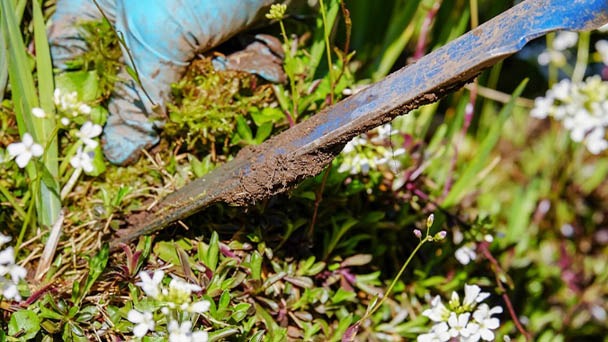
Weeding has to rank among the least enjoyable gardening chores, let's face it. Everyone wants to find a quick and simple solution that still produces a perfect lawn or flower bed.
Currently, you may only find the occasional dandelion or tap-rooted weed here and there, but in a matter of days, it could turn into a field of dandelions as seeds spread with even the slightest breeze! Therefore, let us provide you with the best dandelion removal tools so you can select a dependable and effective dandelion puller to save you time and backache.
Best Dandelion Removal Tools Overview
1. Best Overall - Grampa's Weeder, The Original Stand-Up Weed Remover
2. Best for Leverage - Edward Tools Weeding Tool
3. Best for Tight Areas - Seymour 41035 Dandelion Weeder
4. Best for Large Weeds - CobraHead Original Weeder & Cultivator
5. Best Long-Handled Cobra Head Weeder - Hoss Tools Single Tine Cultivator
6. Best for Self-Ejecting the Weed - Fiskars 339950-1002 4-Claw Weeder
7. Best for Avoiding Kneeling - Garden Weasel Step and Twist Hand Weeder
8. Best for Versatility - AMES 2917300 Steel Stand-Up Weeder
9. Best for Durability - CFCT Aluminum Hand Weeder Tool
10. Best Budget-Friendly Option - GANCHUN Hand Weeder Tool
11. Best for Small Weeds - CobraHead Mini Weeder & Cultivator
Best Dandelion Removal Tools
Best Overall - Grampa's Weeder, the Original Stand-Up Weed Remover
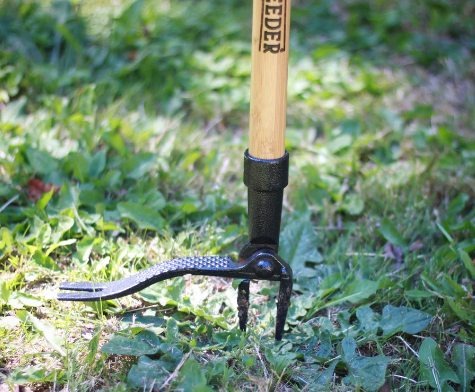
Grampa's Weeder is my overall top pick for the best dandelion digger due to its straightforward, robust design. This one is a sure thing to work out! Using its two claws, the weeder digs into the ground above the weed to do its work. Using the foot lever as leverage, you then lean the pole back. The sturdy wood handle and steel head of this stand-up weed puller enable it to function effectively in any soil type.
Pros:
- It's durable.
- Any soil type can use it successfully.
- It is simple to use and has a simple design.
Cons:
- The claw must be manually cleared of weeds.
- Frequently, the weed also lifts up dirt clods.
Best for Leverage - Edward Tools Weeding Tool
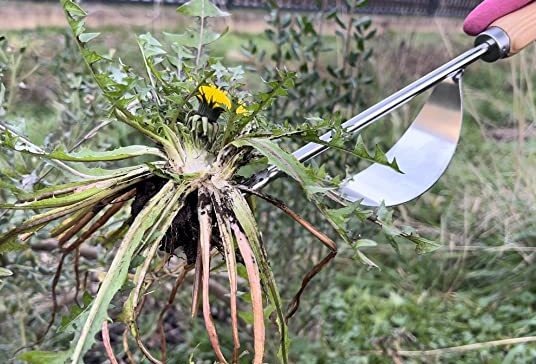
This little dandelion digger works wonders on weeds with big, deep roots. When pulling the weed from the ground, it has a V-nose end with a curved metal base that serves as leverage. To prevent hand drowsiness, it has a comfort-grip handle. The Edwards Tools Weeding Tool does an excellent job of removing weeds while causing little harm to neighboring plants.
Pros:
- Good leverage is provided by ergonomic design.
- It is easy to hold.
- For weeds with deep roots, it is effective.
Cons:
- Small weeds are difficult to pull with the V-nose.
Best for Tight Areas - Seymour 41035 Dandelion Weeder
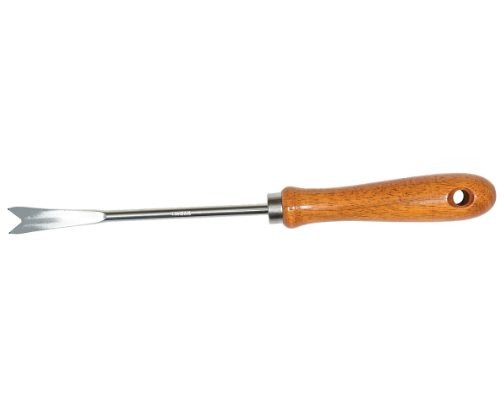
The Seymour 41035 Dandelion Weeder is a small, straightforward device that effortlessly removes dandelions. It's a fantastic small tool to have in your collection, and the wood handle is strong. Even though it lacks many frills, its performance places it among the best.
Pros:
- Small weeds and dandelions respond very well to it.
- It is well-made.
- The nearby plants are not harmed by the tiny blade.
Cons:
- In dense clay soil, it doesn't perform well.
Best for Large Weeds - CobraHead Original Weeder & Cultivator
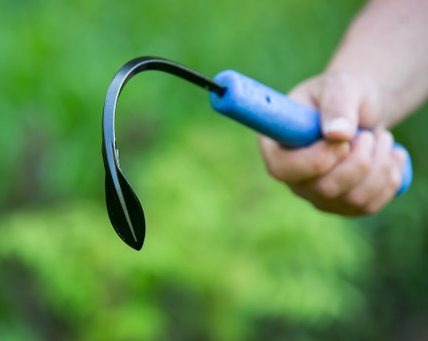
Because of its distinctive shape and name, the CobraHead weeder stands out from other weeders. The makers of the company created this dandelion digger after realizing how useful a single tine from a hand cultivator was for weeding. On a handle made of recycled plastic, it has a sturdy steel head. It's one of the best options for moving around and removing weeds with deep roots.
Pros:
- It is American-made.
- High-quality steel makes up the head.
- For big weeds, it really works.
Cons:
- Use of the design requires practice.
- Some people didn't like the sharp blade's tip.
Best Long-Handled Cobra Head Weeder - Hoss Tools Single Tine Cultivator
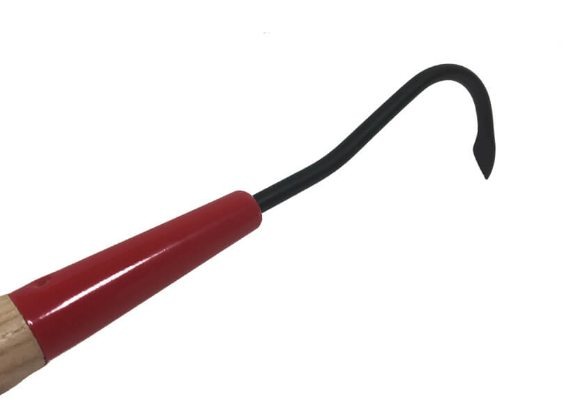
Similar to the Cobra Head, the Hoss Tools Single Tine Cultivator cultivates without bending over because of its long handle. To get under large weeds between vegetable rows, use the 54-inch hardwood handle.
Pros:
- It's American-made.
- Lifetime coverage is provided.
- Kneeling is avoided by the long handle.
Cons:
- It costs more than alternative weeders.
Best for Self-Ejecting the Weed - Fiskars 339950-1002 4-Claw Weeder
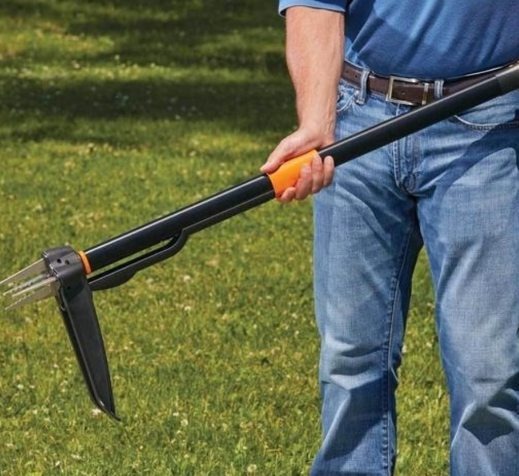
Despite having a similar design to Grampa's Weeder, the Fiskars 4-Claw Weeder has the ability to self-eject the weed. For grabbing the weed, it also has four claws rather than just two. It has a wide footplate for driving the steel claws into the ground and an offset handle for your hands' increased comfort.
Pros:
- Self-ejecting capability is available with this weeder.
- The footplate is very big.
- It helps prevent hand and back aches.
Cons:
- Not as long-lasting as other models is the handle construction.
Best for Avoiding Kneeling - Garden Weasel Step and Twist Hand Weeder
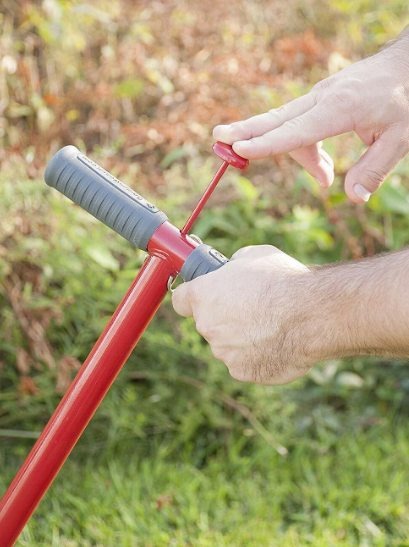
The Garden Weasel stand-up dandelion digger operates by digging into the ground with its two steel claws and ejecting the plant with its thumb release. If getting on your knees in the garden bothers you, this model is ideal. To get the weed out of the tool, you don't even need to stoop down. It is a solid, long-lasting option because the entire tool is made of steel.
Pros:
- It's well-made.
- For people who enjoy standing, it's fantastic.
- It has the ability to self-eject.
Cons:
- Footplate is small.
- Large clumps of dirt are frequently pulled out by it.
Best for Versatility - AMES 2917300 Steel Stand-Up Weeder
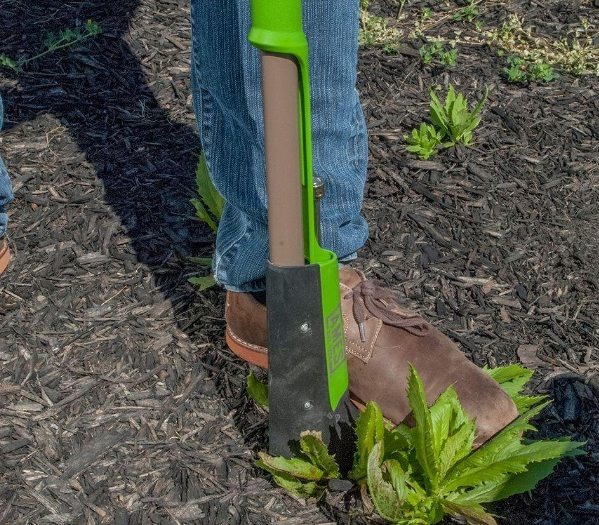
Instead of the more common straight tines, this AMES stand-up weeder has curved steel tines. It has an ejection shaft for when you're prepared to release the weed, and the curved tines help the weed hold in place better. You can accomplish several tasks with this one tool because the curved tines are also useful for aerating the soil.
Pros:
- The T-grip is soft and convenient.
- It's lightweight.
- The curved tines serve two purposes.
Cons:
- The footplate is not very large.
- There is poor quality in the plastic handle.
Best for Durability - CFCT Aluminum Hand Weeder Tool
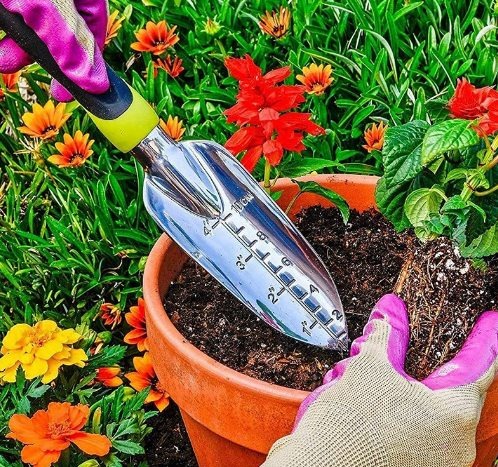
You don't need to be concerned about any parts coming apart because this dandelion digger is made entirely of one piece. It can be used as a trowel, weeder, or bulb planter and is made of premium cast aluminum. It has a V-nose that is similar to the Edwards Tools model and is useful for getting under and around roots.
Pros:
- The sturdy design is expertly constructed.
- It has many uses and is simple to use.
Cons:
- There may be holes in the ground from the wide head.
Best Budget-Friendly Option - GANCHUN Hand Weeder Tool
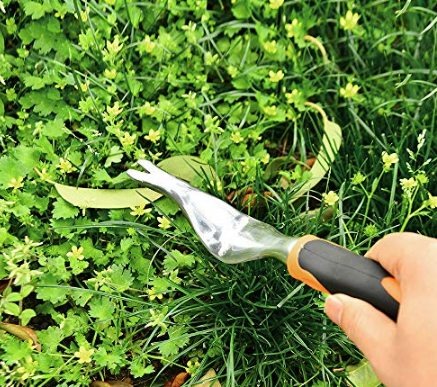
For those on a tight budget, this dandelion digger is ideal. It has an ergonomic handle and is made of aluminum alloy. When pulling up weeds, the V-nose head integrates with a curved shaft to provide more leverage. For the price, this weeder is reliable and effective at getting rid of big weeds.
Pros:
- It's cost-friendly.
- A secure grip is provided.
- On weeds with deep roots, it works well.
Cons:
- Compared to steel models, the aluminum blade is less robust.
Best for Small Weeds - CobraHead Mini Weeder & Cultivator
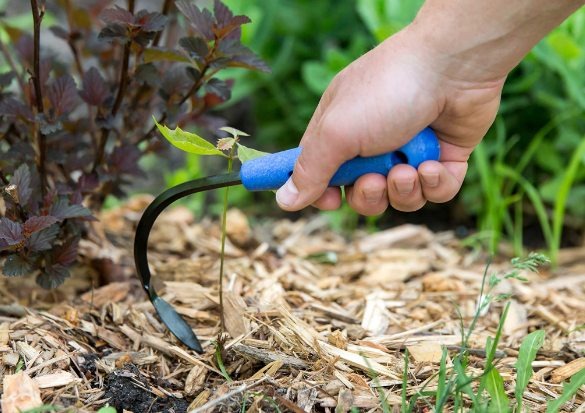
The CobraHead mini weeder resembles its larger brother but on a much smaller scale. To cut through small, taproot weeds with little to no damage, the steel blade head is used. For people who have raised beds or container gardens and need to get rid of tiny, emergent weeds, this is a helpful tool.
Pros:
- It is simple to remove weeds with shallow roots.
- It's made well, the steel head.
- For getting between plants, it works well.
Cons:
- The bigger weeds won't respond well to it.
When to Use a Dandelion Digger
The springtime, when dandelions bloom, is a good time to get rid of them. The roots probably won't be as big at this point because you'll be catching them before they reseed.
The fall is a good time to get rid of dandelions if you don't want them to come back the following year.
In order for your garden to yield the best crop, it is a good idea to remove all weeds throughout the entire growing season.
Different Types of Dandelion Diggers
Stand-Up Weeder
A long handle that is typically connected to a T-grip is present on stand-up dandelion diggers, allowing you to maneuver the weeder. They have two to four tines that are located at the handle's tip and are used to pull weeds. The weeds (and more importantly, the roots) will come loose by twisting and pressing down on the footplate. Some models of these additionally come with self-eject features.
Handheld Weeder
For those who prefer to garden on their knees, handheld dandelion diggers are useful. To remove weeds from the ground, they have V-nose heads and a curved shaft. Typically, the overall length is 12 inches. The cheapest dandelion weeders are typically hand-held weeders.
Cobra Head Weeder
Small weeds in confined spaces can be eliminated by cobra head weeders. They have a single, curved tine that extracts the root by penetrating the soil beneath it. Depending on your preference, cobra head weeders are available with either long or short handles.
How to Choose a Dandelion Removal Tool
Dandelions are among the most widespread weeds. Dandelions are an eye-catching weed with a yellow flower head, but they shouldn't be a constant in your garden design. Once established, they seem to keep growing.
The goal is to get rid of the weed before it becomes established. Otherwise, the root structure forms, making it simpler for dandelions to quickly regrow.
There are many options available to you, and the fact that many of them are quite similar makes things more difficult. The best dandelions tool will ultimately be the one that makes the task simple, quick, and suits your needs.
We've listed a few criteria below to help you decide which dandelion tools are best for your particular working environment.
Handle Length
choosing a tool with a suitable handle that will enable you to exert as little effort as possible while achieving the best possible results. Both the short-handle and long-handle designs are available to you.
Short-Handled Dandelion Tools
For close contact with your plant, short-handled tools work best.
If the weeds are clustered or packed closely together, you can use this tool to pull them out, but you'll need to either bend over or get down on your knees to work with them. If you want to have more control over how the soil is distributed in your garden, short handles are also fantastic.
When using short-handled tools, the weeds' area needs to be smaller. If not, you'll become worn out.
Long-Handled Dandelion Tools
When you don't want to kneel when weeding your yard, long-handled tools should be your first choice. Additionally, these are much more practical to cover bigger areas in less time.
Short-handed tools can occasionally be challenging for people to use because of mobility problems like arthritis or back pain. Longer handles are still useful in those situations. Additionally, a few of these tools have "grab claws" that enable you to pick up and throw away dandelions without touching them at all.
Head Type
The most significant component of dandelion removal tools is the "head."
You see, it is this section that gets rid of weeds from either the shoot or the root. There are various weed removal head types as well, each with unique benefits and drawbacks.
Dandelion Puller
The dandelion puller traditionally has a distinctive method of operation. a long handle with a claw head that digs into the ground near the roots and base of dandelions. The weed is forced out of the ground by using the long handle's leverage when it is pulled perpendicular to the ground. similar to pulling the fork back to lift and loosen the soil when using a garden fork.
The traditional dandelion puller has undergone some changes recently as technology progresses, including twist-operated pullers and a version with trigger handles. Activated by pulling a trigger on the handle, which closes the claw head and effectively cuts out the weed before pulling it out of the ground.
Hoes
Hoes are weeding tools that not only assist you in getting rid of the weeds but also enable you to cultivate the soil afterward.
It's a fairly simple tool that makes the de-weeding simple. You'll need to sow additional seeds after you've finished digging up the roots to stop dandelions from sprouting up again.
With garden hoes, even plowing is simple because you can quickly pull out the roots and turn the soil.
Knives
Probably the most typical kind of weeding tool is a knife head. They are able to cut off even the thickest roots and can pierce through the soil.
For lifting weed-filled areas, stab the ground deeply with the tool's sleek head. The soil will become more aerated after plunging, which is beneficial to most plant root systems.
Digger
Despite having a fragile appearance, dandelions are one of the hardest weeds to get rid of. As the entire plant, including its roots, can be forced out of the ground with a single blow when using a digger to remove such weeds, many people prefer them.
Additionally, they are very simple to use: after setting the dandelion digger tool head into the ground, all you have to do is press down with your foot to pull the plant out.
Rake
Rakes are the most effective tool for removing a mass of weeds. You only need to pass the tool over the weed-filled area. This will loosen the soil, enabling you to remove the lifted weeds and discard them.
Additionally, you shouldn't be concerned if some dandelions are left behind because the uprooting will prevent any further growth and they will dry out in the sun. The leftover weeds will decompose into a mulch that will benefit your desirable plants.
CobraHead
People are understandably concerned about this weeding tool's effectiveness as a dandelion tool because the head is as distinctive as its name.
However, the actual reason it's practical and simple to use is due to its distinctive, ergonomic shape. The same action that cultivates the soil also allows you to remove weeds.
Additionally, there is no need to apply excessive pressure because the design of this product allows for natural hand movement.
Dandelion Tool Durability
To remove stubborn weeds from the ground, such as dandelions, a lot of prying is necessary. Because of this, it's possible that tools made of aluminum or plastic will crack or bend under the strain. Additionally, tools made of soft materials won't pierce tough, dry surfaces or dense, clay soil.
To increase durability and sturdiness, it is preferable to spend money on weeding tools made of premium quality steel. Additionally, your investment is protected by a lower likelihood of rusting or breaking.
What Are the Different Tools for Pulling Weeds
The following list of tools will help you get rid of perennial and tap-rooted weeds like dandelions that are difficult to pull out.
Long-Handled Garden Hoe
Because it can produce better results quickly, this traditional tool is a necessity for every garden. If your plants are placed far apart or if you want to get rid of weeds with small roots, we advise using these tools.
Garden Cultivator
The garden cultivator works best for weeds that are tightly clustered. You can easily dig the soil with the help of the three-spike on the tool's top. In fact, a lot of gardeners use cultivators when working in garden beds.
Oscillating Hoe
This tool's blade, as its name implies, moves backwards and forwards each time it comes into contact with the ground. With this push and pull motion, oscillating hoes loosen the soil, which accelerates and improves the efficiency of weeding.
Cape Cod Weeder
It's possible for weeds to grow very close to your desired plants, necessitating their safe removal in order to safeguard the other plants. A cape cod weeder can really come in handy here. These weeders are simple to use and have a narrow, sharp blade that makes them dependable in confined spaces.
Fishtail Weeder
Only dandelions can be removed with a fishtail weeder. Its long pole and small diameter make it possible to dig deeply into the soil with considerable effort. For getting rid of weeds from the roots, the V-shaped blade can be very helpful.
Paving Weeder
Herbicides or boiling water are frequently used to get rid of weeds, especially when they have spread between concrete seams or paving stone paths. However, on these particular, difficult spots, a paving weeder can work its magic.
Frequently Asked Questions
Do Dandelion Pullers Work?
The method used by dandelion pullers involves lifting the plants by the base and digging out the long taproot. In the ground, taproots can extend up to 18 inches. One plant can be reproduced from just a small portion of the root. As a result, it's crucial to get rid of all the roots.
Why Do I Need a Weeder When I Can Just Use My Hands Or Herbicide?
The time spent weeding is greatly reduced with the aid of weeders and dandelion diggers. This gives you more time to work on additional garden projects. A few weeds also have sharp points and prickliness. You don't have to manually grab these and run the risk of getting stuck thanks to weeders.
Weeders are excellent for organic gardening as well. You don't need to be concerned about applying harsh chemicals or herbicides to yourself, your pets, the plants around you, or even the vegetables.
I've Been Weeding My Garden, and They Keep Coming Back. What Do I Do?
Make sure to pull out the whole root when weeding. The weed will typically reappear if you only remove what is visible on the surface. To prevent the weed from reseeding in the neighborhood, set aside the extracted weed in a bucket and discard it later.
If you are weeding your lawn, you can reseed the damaged area with your preferred grass seed to stop weeds from establishing themselves.
Is There An Easier Way to Work the Root Out?
Wetting the soil 30 minutes before digging up any weeds is one tip for getting rid of them. The roots will grow up faster and more easily due to the moist soil. If you reside in a region with dense clay soil, this is a fantastic idea. You won't run the risk of breaking your weeding tool because it will be easier to use.
Wrapping Up the Best Dandelion Diggers
A faster, more natural way to keep your garden under control is with dandelion diggers. By looking neat and thriving with healthy plants, your garden will thank you for keeping weeds under control. Grampa's Weeder is my top choice for the best dandelion digger due to its robustness and ergonomic layout. I also have several of those listed for you if you prefer handheld or cobra head weeders!
Latest Updated
- Benefits of Bugleweed - 7 Science-backed Health Benefits
- Bugleweed Dangers & Side Effects - Is It Poisonous?
- How to Plant Evergreen Trees - What You Should Know
- When to Plant Evergreens - Grow Guide for Evergreen Trees
- 12 Wonderful Evergreen Shrubs for Your Garden
- 12 Popular Evergreen Plants with Pictures for Beginners
- When And How To Prune A Lilac Bush Like a Pro
- How to Grow & Care for Lilac Vine (Hardenbergia Violacea)
- Japanese Lilac Tree (Syringa Reticulata) Care & Propagation Guide
- Shumard Oak Pros and Cons - What to Know
Popular Articles
- Winter maintenance of Antirrhinum Majus
- How to Grow Terminalia Mantaly Tree
- How to Grow and Care for Crossostephium Chinense
- How to grow Antirrhinum Majus in spring
- Peristeria Elata (Dove Orchid) Profile: Info & Care Guide
- Underwatered Snake Plant (Sansevieria Trifasciata) - Signs And How To Fix
- How to Care for Brazilian Jasmine Plant (Mandevilla Sanderi)
- How to Grow & Care for Graptopetalum Purple Delight in Summer
- Rosa Chinensis (China Rose): Plant Growing & Care Tips
- How to Care for Baby Sun Rose (Aptenia Cordifolia)